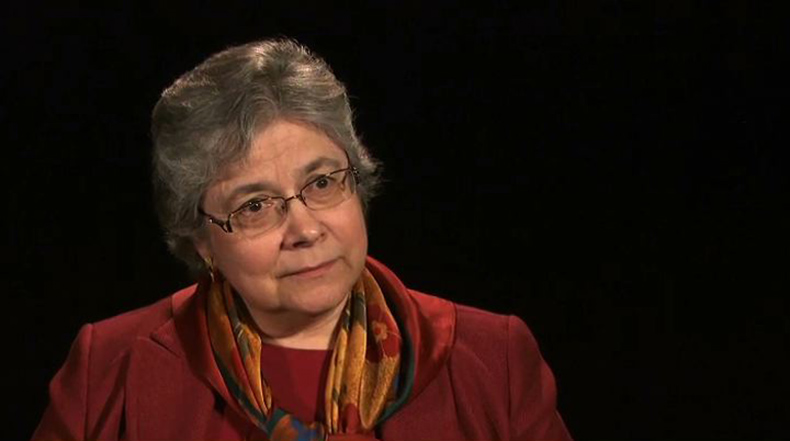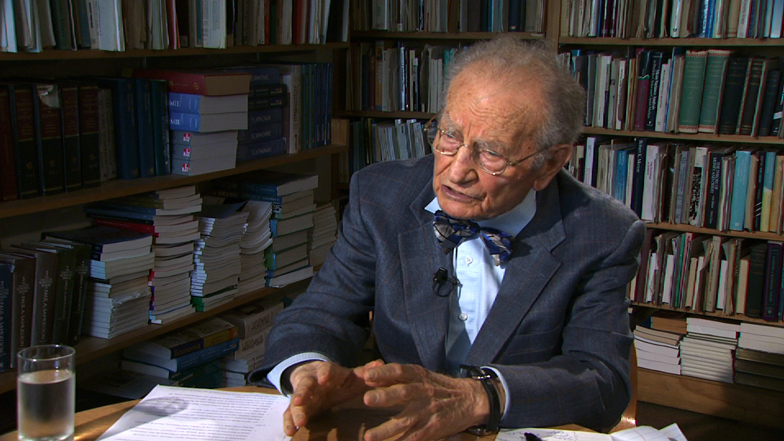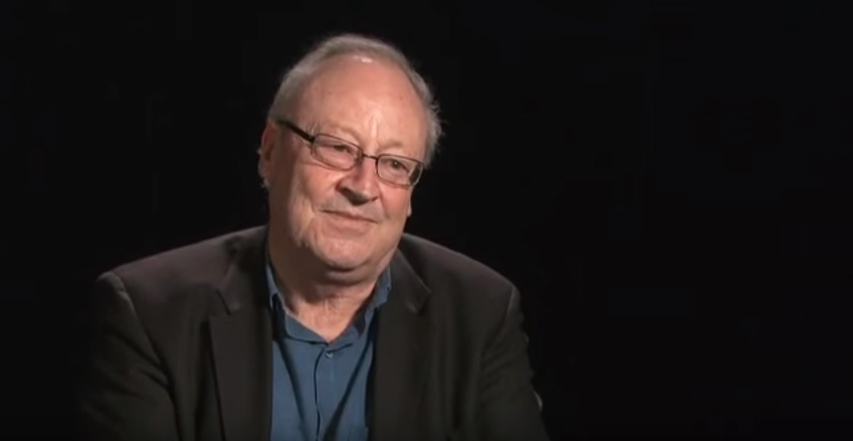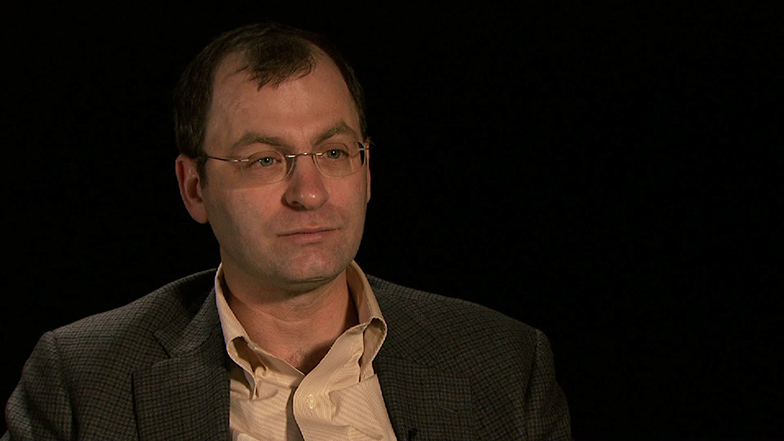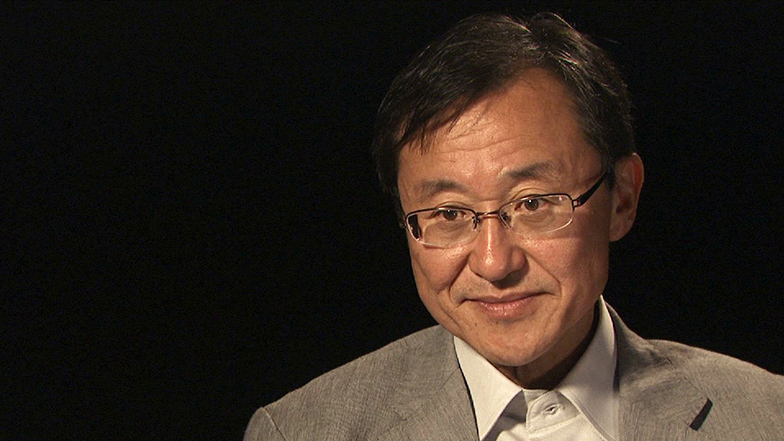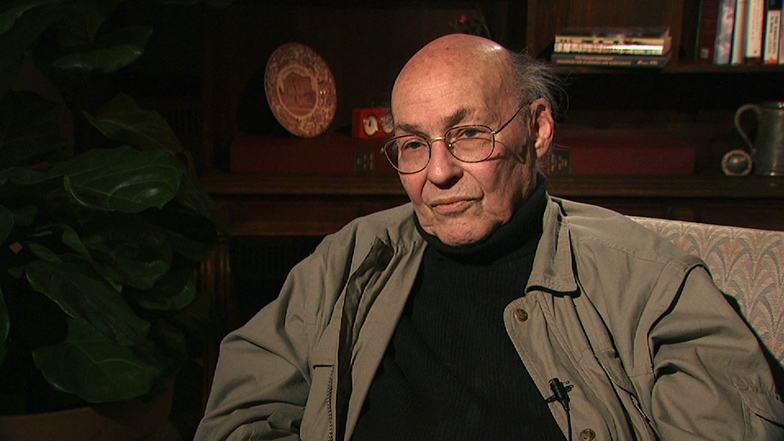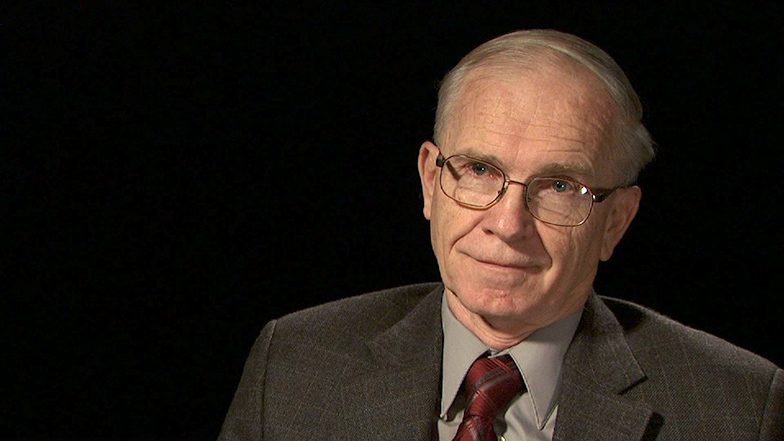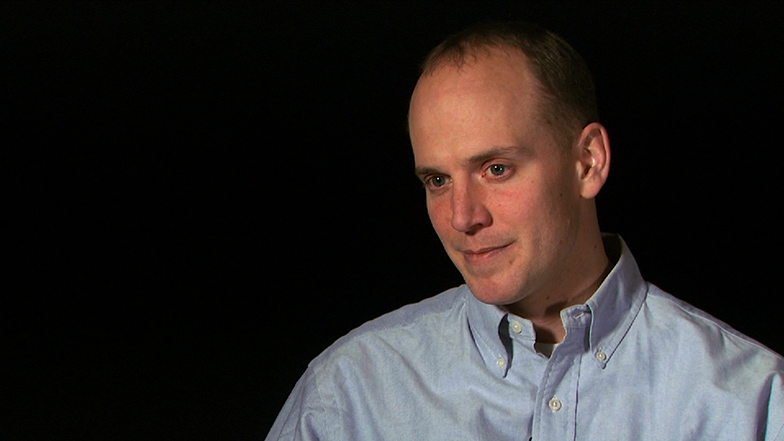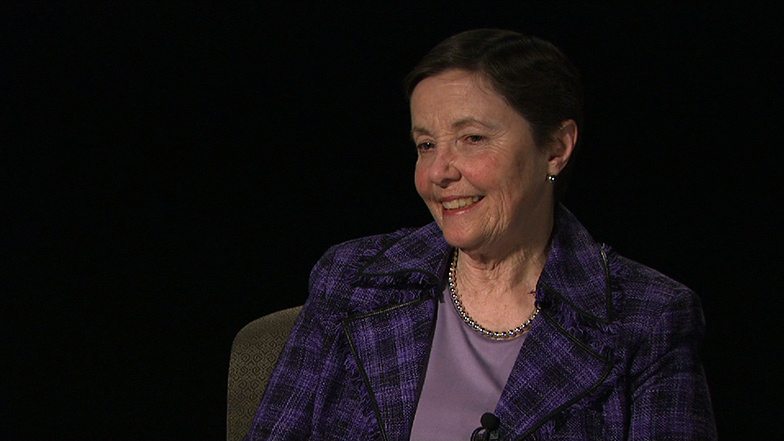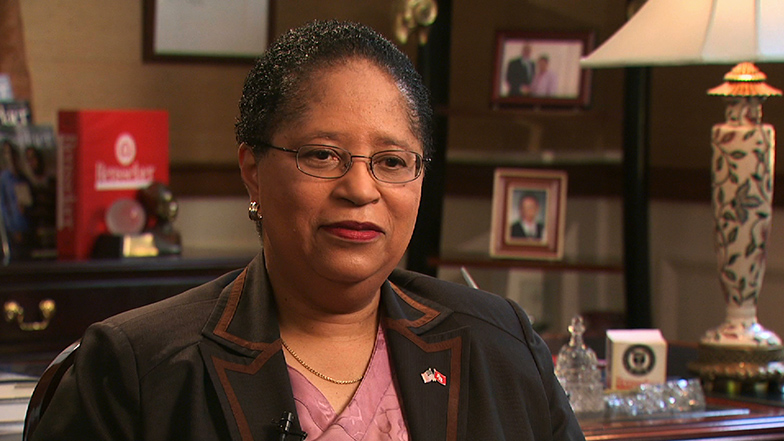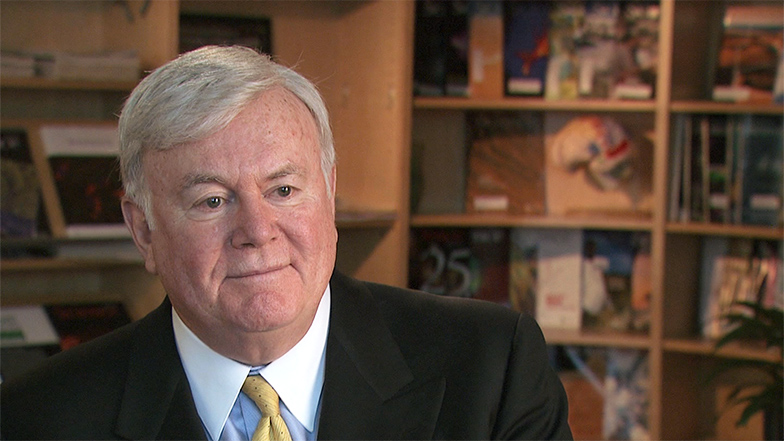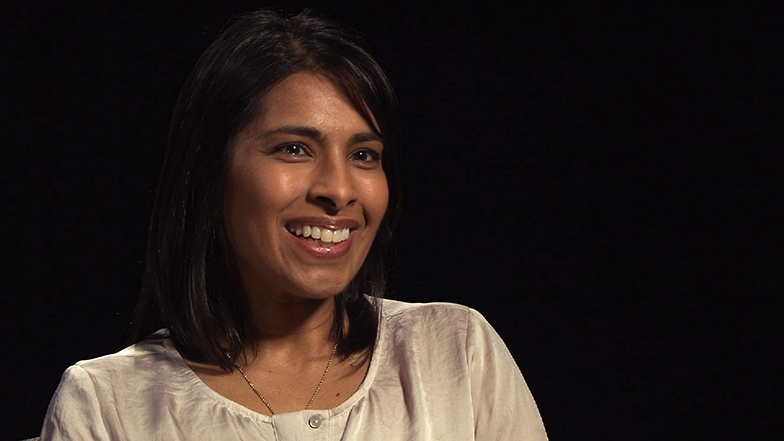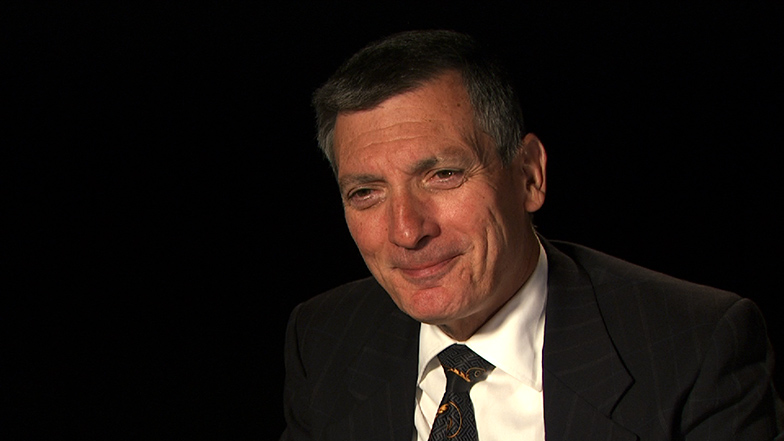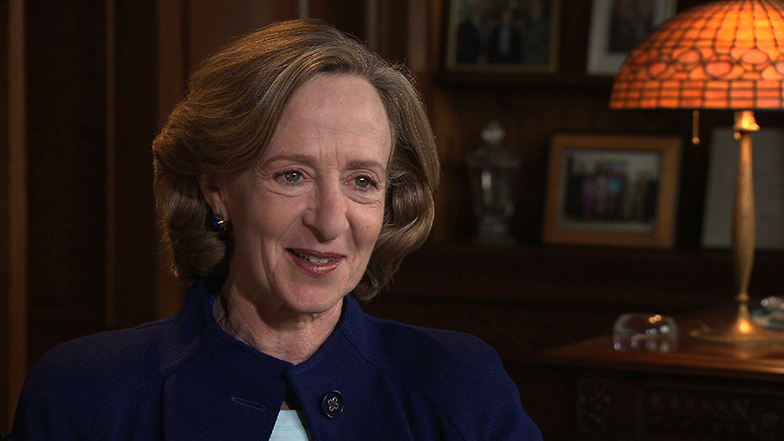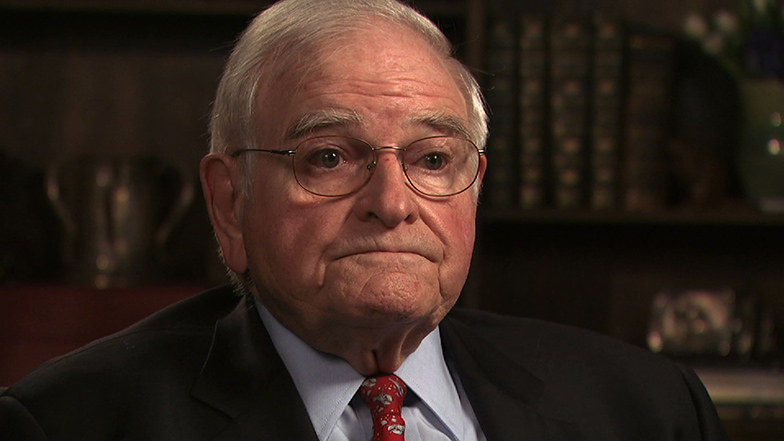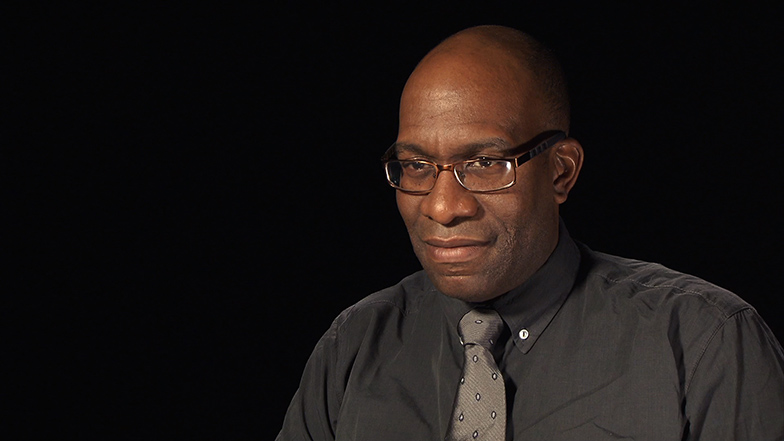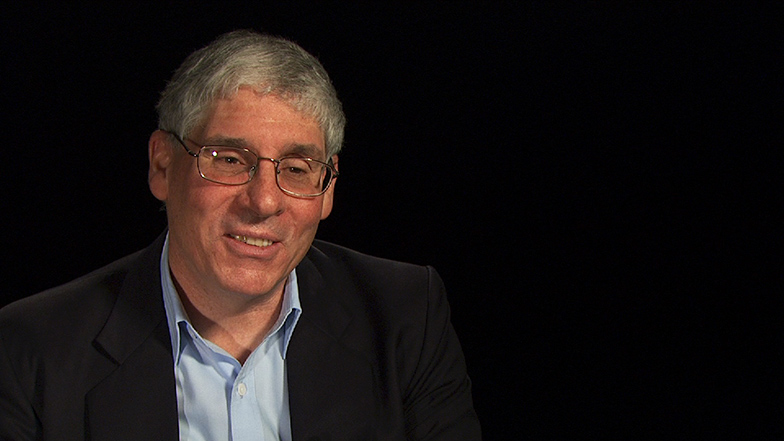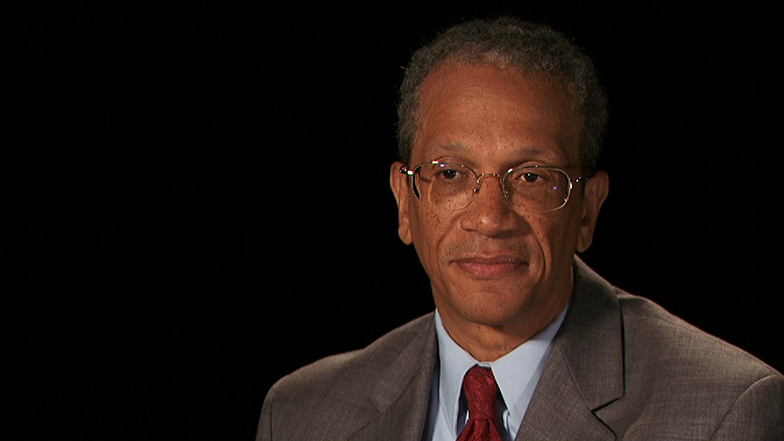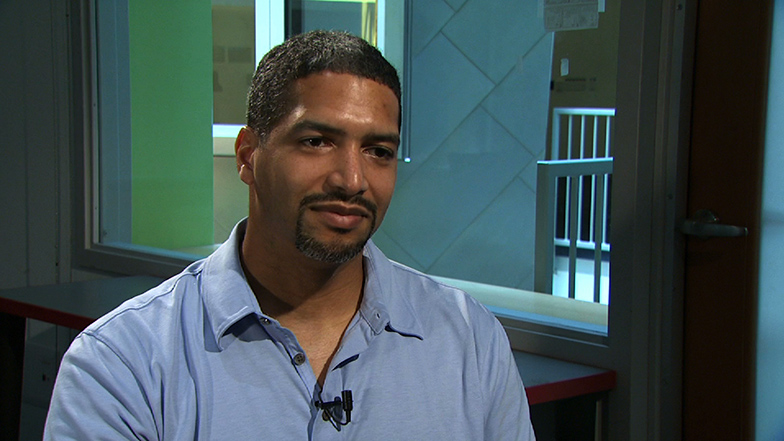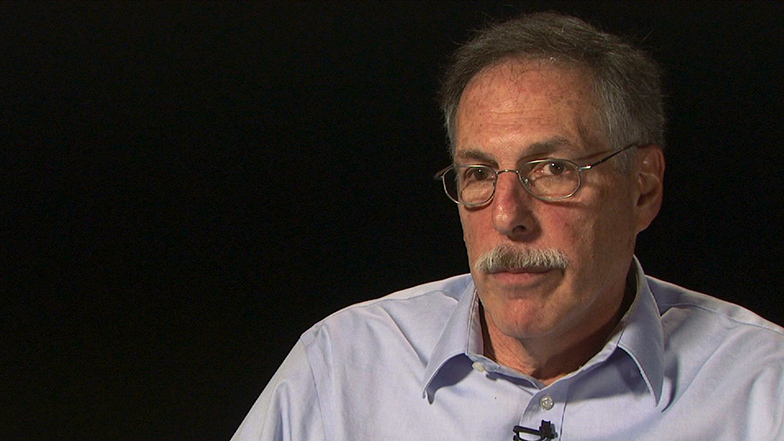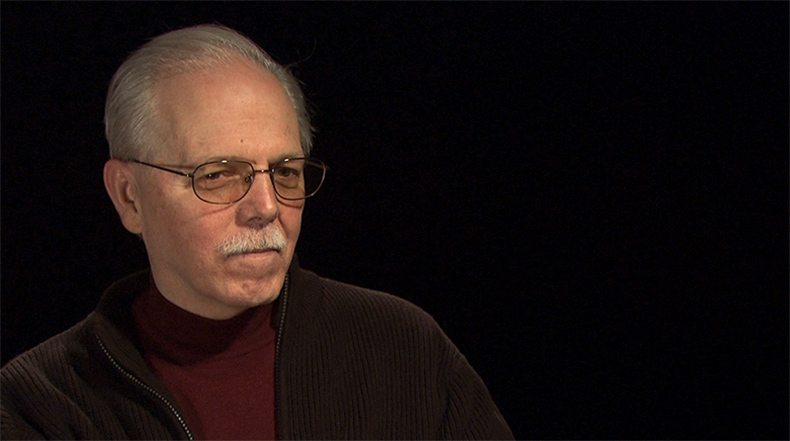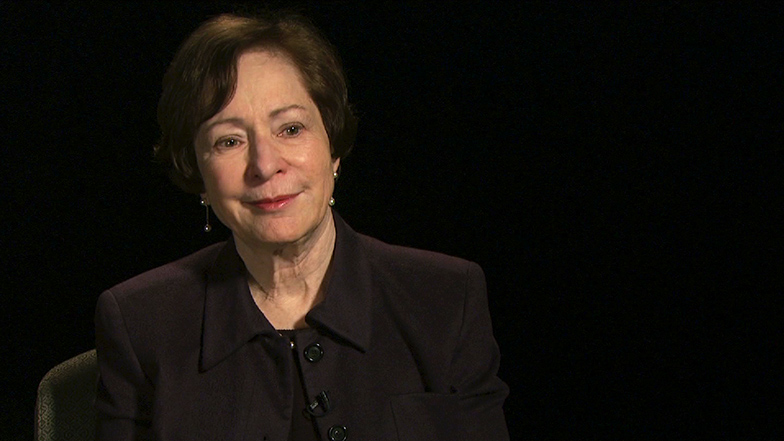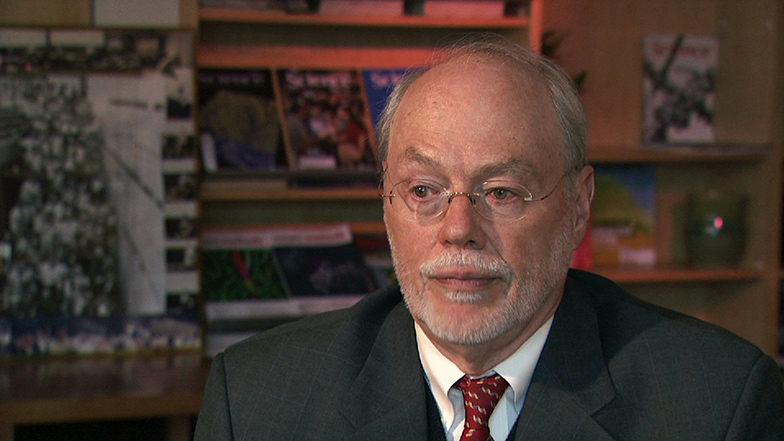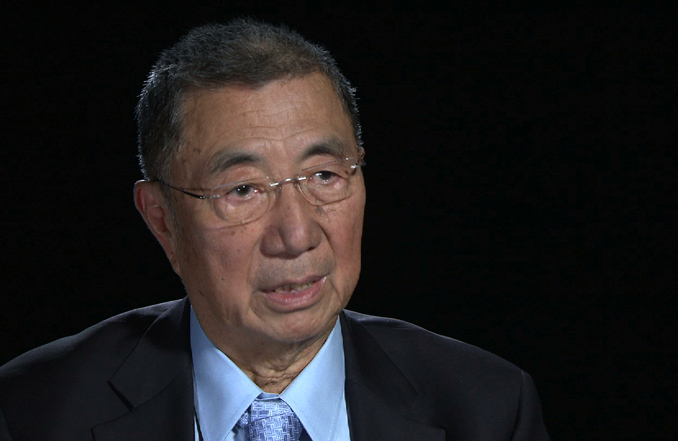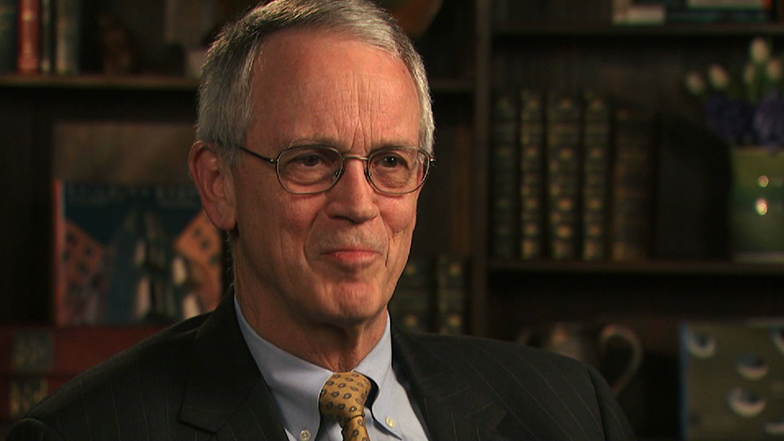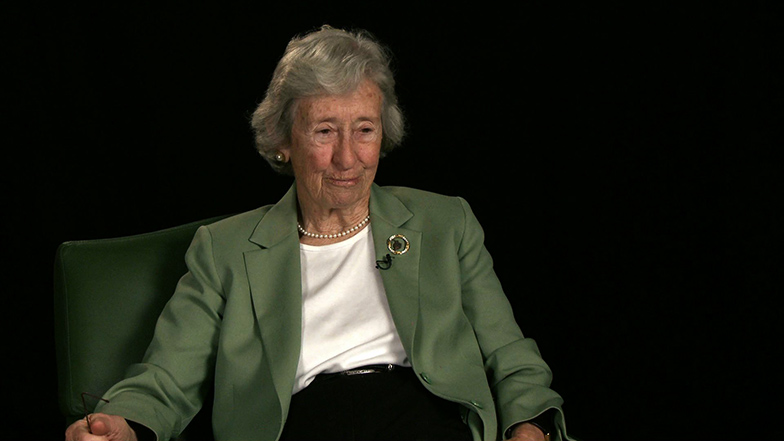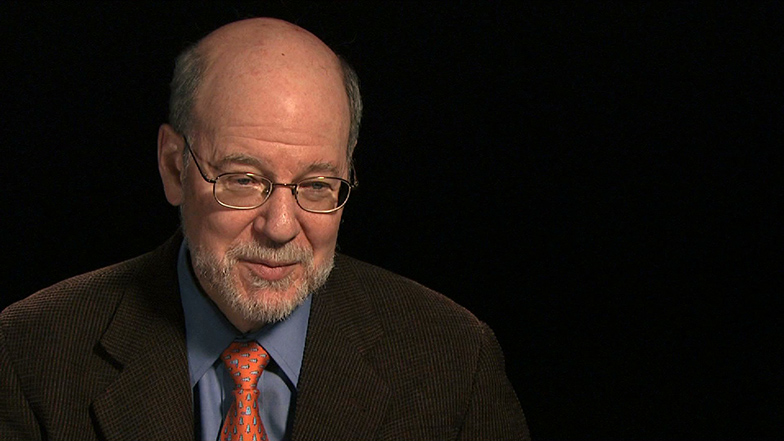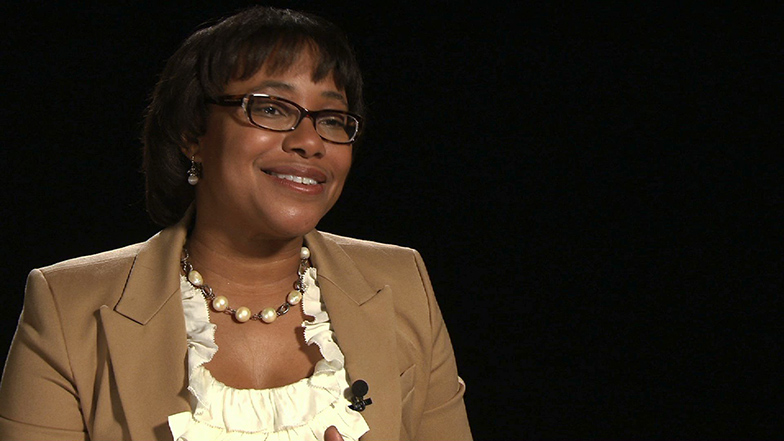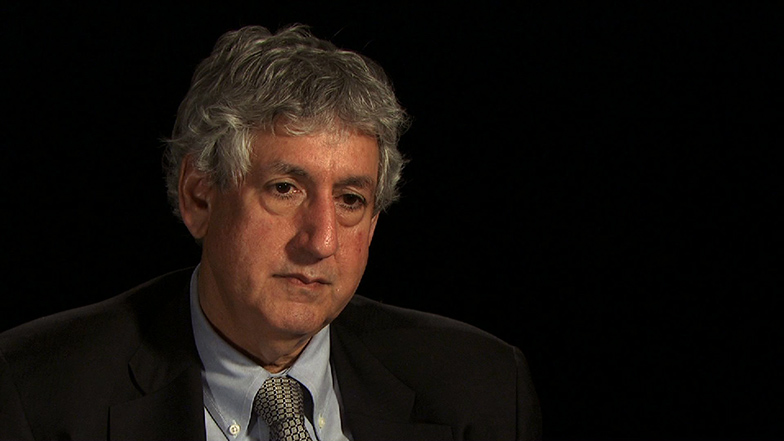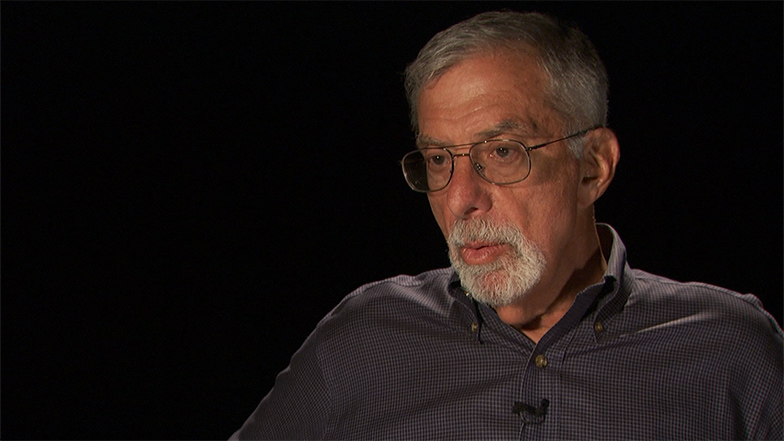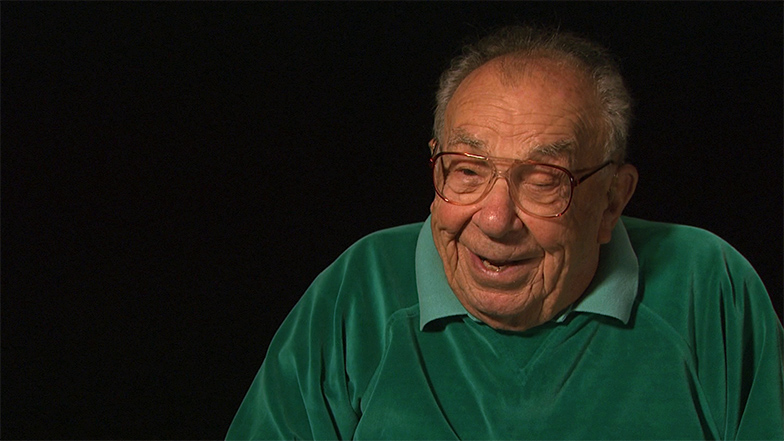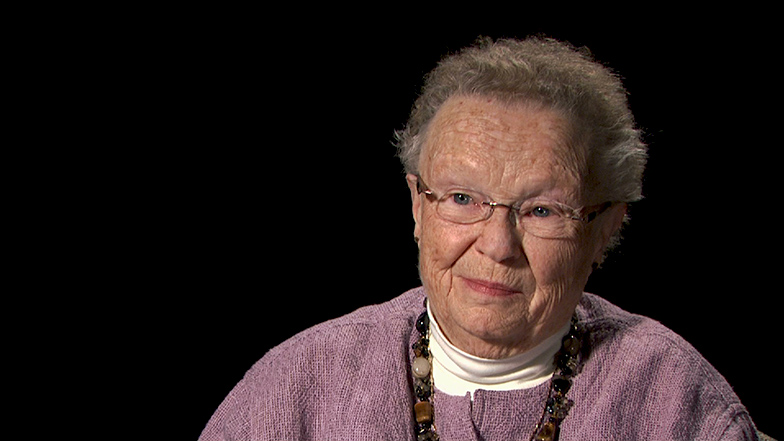James D. McLurkin ’95, SM ’04, PhD ’08
MCLURKIN: My name is James McLurkin, born in 1972. I'm an only child, no brothers, no sisters. I have a dog and pet ant.
INTERVIEWER: Were you born in Baldwin, New York? Or were you born somewhere else? Did your parents move when you were young?
MCLURKIN: So I spent most of my time growing up in Baldwin, New York; a sub-burough of Manhattan, about 20 miles out of the city. We moved around a bunch before I got to sixth grade. Then we got to Baldwin and then I stayed there. So that's where I claim.
INTERVIEWER: You got into high school, so you entered high school in 1986, but around then a lot of different stuff is happening. Do you have any specific memories of kind of seminal moments in American history? Like the Challenger? Or the first experience with a computer?
MCLURKIN: Let's see. So in 1986 entering high school. So my first experience actually with a computer, I remember Challenger 1980-- the first shuttle launch because they actually wheeled a television into my fourth grade classroom. That was a very big deal to have TV in class. My first computer came in '82. Actually my cousin was the instigator for a lot of my interest in technology. He's a year and a half older than I am. He and his family went to Disney World, and it was me, my grandmother, and my mother stuck in Virginia for the holidays. And he left his computer. So it was clear who I spent most of the time with that Christmas break. So after I got back home for Christmas I insisted that my Dad get me a computer.
So after Christmas we got a computer, an Atari 800XL. Had a whopping 64 kilobytes of memory, which was just unheard of. It's a huge, huge amount of memory. And I think it ran at one megahertz. It was a pretty studly machine. He didn't buy me any games, so I had to sit and write to copy programs from computer magazines.
So, what else do I remember from the '80s? Well, Transformers is on the mind right now because of the big mega hit that came out in 2007. And that was a big deal in the 80s. I mean, what do I remember from the 80s? I remember everything from the 80s.
INTERVIEWER: Well when you were programming video games were you programming in Basic? Or were you programming in something else or you just--
MCLURKIN: So in the era of the Atari, in the era of the computer hobbyists-- I got into it at the late end of the computer hobbyist kind of thing. And magazines would print code that you would type in. They'd print video games, so it was all in Basic. So we type in stuff in Basic, and they had [UNINTELLIGIBLE] with subroutines. You typed those in too, so it would be pages and pages of numbers-- of data and numbers and characters. And then they got sophisticated and they gave you little checksums. So you type this little program up that would then look at your code and give you some numbers about your numbers. You compared the numbers in the magazine and see if the numbers you typed were the correct numbers. I would recruit my parents sometimes to read me these numbers. They were not as amused at reading pages of numbers as I was. But it was a lot of fun. And programming video games for that class of computer-- where you have really serious computational constraints, something that helped me a lot when I was working on robots.
INTERVIEWER: So you entered high school, what was it like? Were you interested in going to college right away? Did you know what kind of track you were going to take after you get out of high school?
MCLURKIN: My interest in college was something-- I come from a long line of college educated African Americans, which is not very common. I'm a fourth generation college educated in my family. So the notion of going to college was never something I thought about. I actually didn't really know very much about different colleges. My mother and my father both went to Hampton, which is a historically black college in Virginia Beach. I just assumed I'd go to Hampton. I didn't really know anything about different colleges. And then I saw-- on Nova-- I saw a competition of what was then 2.70 270, the Intro to Mechanical Engineering class.
And they had these students. They had these things they'd built. They were driving around. They were competing. They were getting balls in cups and I was like, wow! That's great. I'm going there. And my mom's like, well, that's MIT. That's a hard school to get into. I was like, fine, I'm going there. That's where I want to go.
INTERVIEWER: You always allude to yourself that you're a geek. This is a fact that you're proud as a geek. And maybe you can explain what qualities make you a geek or what qualities are geek that you have as well? Is it something that should be aspired to or is it something that's a name?
MCLURKIN: So, I'm definitely a geek. You know, what is a geek? So at MIT you really have to kind of be careful with geeks, nerds because all these things have very different meanings. A nerd is somebody who is smart, intelligent. That works hard and does things. Is very nerdy, very hardworking. They can fit in socially, but a geek is someone who just doesn't quite fit in socially. And you don't really need to be smart to be geeky. But you do need to be interested in geeky kind of things, like science fiction and robots. And I have pet ants and I used to love BMX bicycles that put you on the fringe of society. This is before the X Games in the 80s. If you were a BMX guy you were some weird bicycle guy. All these things make you kind of geeky. But mostly interested in science, technology, science fiction, transformers, and--
INTERVIEWER: You had all these interests while you were in high school?
MCLURKIN: Oh yeah, all these interests were all in high school.
INTERVIEWER: You mentioned that in high school it was particularly being black and intelligent-- high school is difficult and it was painful. Was it the high school you were in, high school in general? Was it something that the lack of a role model-- I mean, what made it particularly difficult?
MCLURKIN: So being intelligent and interested in science and technology in America, at any age, is difficult. Being interested in technology and science and technical things in high school is especially difficult because now you're pushed out to the nerdy geeks and fringe of society. Being African American in high school and in to these things, you're now at a very small microcosm. And my high school that gave me a peer group of something like 3 out of 1,600 students. So socially, very difficult and I didn't quite fit into the black community because I was doing all this honor's geeky, nerdy, BMX stuff. I didn't have enough sophistication to be cool back then. Didn't know how to do it, wasn't interested in it. And didn't fit into the people in my classes. They were all white people. And it wasn't really a click friendship- wise. So it was difficult. And then you have to deal with all of the stuff of just being intelligent and geeky in high school in general is going to get you picked on in the locker room. It's going to get you chased around in the hallways and you have to deal with all that stuff too. So high school just was generally unpleasant.
INTERVIEWER: Did you have any particular mentors or advisors who really stood out for you then? Who really cheered you on, besides your parents?
MCLURKIN: The bright spots in high school come from Mom and Dad, always very supportive, always very encouraging. Dad is an engineer by training, electrical engineer. And southern by birth from South Carolina. So when things are broken you don't throw them away, you take them apart and fix them. And things were always being taken apart and fixed. Everything was in a constant state of repair and re-repair. So lots of hands-on technical learning. And my mother, who I lived with, my parents are divorced, so I lived with Mom. She didn't understand all the technical stuff, but was very good at the logistics of getting resources and supplies, and getting things in the house that I needed to build robots. She had no idea what I was doing, but she found me a electronics store. She recognized that I had outgrown Radio Shack and got me to a local electronic store that had a much broader selection of components for me to use. So that's the core, the support.
You get to high school and my favorite science teacher-- well, actually when I got to high school I wasn't in any honors classes. I didn't do very well in middle school. I wasn't interested in studies or grades or with things like that. But I had one in high school. My ninth grade biology teacher recognized that I was bored, recognized that I could do much more and she put me in Honors Science, which was a big eye-opening experience. Classes were now much were interesting. The content was interesting, the teachers were much more interesting. In particular, my teacher was professor Eugene Warasilla and he was great because he ran another course. So he taught AP Biology at a very high level. And then he ran another course called Science Research Skills, which was an independent project course. You showed up with an idea and they would support you, not so much-- well, if you're doing biology he had all the resources you needed. But I was building robots, so from him I didn't get so many resources as I did get encouragement and moral support and competitions and good programs to enter. And just the validation that this is the good use of your time, working on this technology is very good. That was huge in terms of high school, that was huge support.
INTERVIEWER: So you applied at MIT, did you apply at any other colleges or were you just so set on MIT that you wouldn't take no for an answer?
MCLURKIN: So did I apply to other colleges? Kind of. I applied to MIT. I got in early, and I was done at that point. And then mother-- MIT was just a little expensive, even back in the early 90s it was still expensive. So she wanted to apply to other places and I was done. So we came to loggerheads on this issue. And the compromise was that she went to my computer and modified and printed my statements and filled out the applications for me and I signed them and mailed them. So I got into a bunch of other places, but then when the time came to select schools I had made my preferences very clear. And they eventually conceded that MIT was not such a bad school to go to.
INTERVIEWER: What were your parents' reactions to you going to MIT or your other friends or your advisors-- there's a sense of what MIT should be?
MCLURKIN: What were other people's reactions to me going to MIT? Well you've got the standard mix of encouragement and support and jealousy and disbelief and people who-- I had a bunch of friends on the newspaper and none of them were surprised. They were all very supportive and that was good. Mr. Warasilla of course, was ecstatic and he had no doubts. It was usually positive. I remember the day actually, I remember I came home. It was about that times, so it was about letter time. And there's this letter in the mail box and it couldn't have had more than one piece of paper in it. And I was like, man, this is a really small letter. So I rode my bicycle over my girlfriend's house and we opened it together. And sure enough I'd gotten in. I felt pretty good about it. And I was a little irritated that they'd sent such a small letter for such a big acceptance. But then after that-- this is before internet e-mail-- after that they sent literally a box of papers and documents and things on clubs. Literally I had a box of MIT mailings after that one letter.
INTERVIEWER: What were your initial impressions when you came to MIT and campus? You came in 1990, right? Was there anything that struck you right away about the campus or the students or just the kind of atmosphere in general?
MCLURKIN: What struck me about the campus right away? I don't really remember my first impression of being on campus.
INTERVIEWER: Where did you live?
MCLURKIN: Well, I remember when I first got to campus. I remember my Dad and I were in his old 1970 green Oldsmobile car. I knew one of the kids, one my friends here from a summer program and the car was about three blocks long. So we pulled up and they had a lot of interesting colorful comments about the size and shape and color of the automobile. I remember the pillars-- the Roman pillars on 77. The first stop was the student center for registration material.
You have the standard feelings of trepidation. You walk into this place, it's very imposing, it's very concrete. It does not feel cold. Didn't feel cold. It wasn't particularly inviting, but there was a lot of energy. Still you can feel the energy. You can cut it. Lots of energy. Actually, the trip on the way up, the last probably 40 miles I spent trying to learn how to spell Massachusetts, which was something I figured I ought to know how to do going here.
INTERVIEWER: Where did you end up living once you finally got the orientation and everything? Did you live in a dorm or a fraternity or a--
MCLURKIN: So rush week was fun, lots of fun. Went around and ate a lot of food. And then selected-- so I was the only child and one of the things that I wasn't prepared to deal with his roommates. So East Campus and MacGregor were two of the dorms that had a large percentage of single rooms. So I selected-- what were my preferences? I think Next House , then New House, then MacGregor then East Campus, and then McCormick. Because after East Campus I wasn't interested in living anywhere else. McCormick was a nice dorm. I figured I'd try to live there.
INTERVIEWER: Did you have an initial group of friends or a club or an activity that you kind of initially got drawn into?
MCLURKIN: The first activity I got drawn into on campus. Actually, the first activity that I got drawn into on campus was the Model Railroad Club. I had model trains when I was younger, when I was in high school and I played with them on and off. I had a big layout in the basement that was in various stages of construction and destruction. I went to visit the Tech Model Railroad Club, and one of the guys there, John Purbrick, he's still there. I still have e-mail contact with him, he's still in the area. Turns out he was the first winner of MIT 270, the class that I saw on TV that pulled me into the place. I didn't realize that until 8 years later. But we worked on the train layout. I worked on some trees or something. They wouldn't let me do anything real because I was just a random freshman showing up. And they went to Buzzy's Famous Roast Beef, which is probably the worst roast beef potato joint in all of the universe. Speaking of things nostalgic, I wish I'd gone back before it closed. It was like 1:30 in the morning and Cambridge is all very provincial, everything's closed at 1:30 in the morning. So the only place to eat was Buzzy's.
INTERVIEWER: So that first year you were there you took the normal assortment of freshman classes? 801, 1801, 102, and did you have any challenges getting through all that? You know, as-- did you really take advantage of pass/fail exempt students [INAUDIBLE]?
MCLURKIN: So the first term in 1990, the first year was pass/fail. And I took kind of a standard class with a bit of tactical rearrangement. Took 1801, 6001, 801X and 3091 my first term. And I took 001 the first term because from what I heard from the upperclassmen the classes are smaller, classes are a little easier and that would let me get through the core EECS curriculum a term ahead. That would give me a little more flexibility with the things at the back.
So I took some advice from my classmates and my first term actually wasn't so bad. My high school prepared me well to come to MIT. And I had the ego. Got through the first term with all passes. I felt pretty good about myself. Second term it got quite a bit harder, and I hadn't really noticed that it was getting harder in a nonlinear fashion. My third term, was first term sophomore year was when the real rude awakenings came because all the classes now I had not seen any of the material. And the classes got significantly harder and my studies skills had not kept up to the pace. So that's when I got my first F, my only F. But I got my first F and my first one ever. No, actually I failed health in middle school, but we're not going to worry about that.
I got my first real academic F and that was a real-- thermodynamics 240. 9 o'clock in the morning, which was just bad already. Had no idea a thing I was talking about. I earned that F.
INTERVIEWER: Did you start off right away in EECS, or did you--
MCLURKIN: Oh yeah. Well, actually so why did I pick my major? Did I start off right away in EECS? I knew that I wanted to do something robots. I'd already built some robots in high school. I wanted to get somewhere with the intersection of mechanical engineering, course 2-- 6 1 or 6 3. And I couldn't figure out between the two of them. So I rationalized that okay, I can learn mechanical engineering by building stuff. I can learn all I need about-- this is the mind of an 18-year-old. I can learn everything I need to know about mechanical engineering by building stuff. And I can already write software, I don't need to learn how to write software. But I'm never going to understand how a radar transmitter works until I take some electrical engineering classes because I don't understand really how these transistors are anything. I don't understand how these capacitors and resistors are doing their stuff. I know that I need a resistor here with the base, the transistor-- these are things I learned in high school through little books from Radio Shack. So I decided to go with electrical engineering.
I later on realized that no, you can't learn computer science and you can't learn mechanical engineering by doing EECS classes. So I ended up with electrical engineering, with a minor in mechanical engineering. So 61 with a minor in two.
INTERVIEWER: Did you work on any projects or UROPs in your first two years here?
MCLURKIN: So my first UROP experience was not building robots. My parents actually made me leave all my robots at home and they made me leave my bike at home too because they wanted me to really focus on studying. They were concerned that I'd get to MIT and spend all my time playing and not doing enough work. There was some wisdom in their plan, but I needed the bicycle. That came up a few weeks later and then the robot came up after Christmas, so second term. But my first UROP was my second term freshman year working on a massively parallel supercomputer. It was the J-machine, the Jelly bean machine. Professor William Dally was the guy running that. And 65,00 nodes. Well, 65,536 or 535 nodes. And my job was to build an ISO card that would fit into a computer that would keep the clock deskewed to less than-- I think something like 6 nanoseconds they wanted. And my God, it was boring. It was just so mind-numbingly dull. I got the card about 70 percent done and I did what every irresponsible undergrad does-- I vanished. And eventually I got some e-mails from the guys, like what's going on? And I had to come to grips that I don't want to do this UROP anymore. So I handed off all my documentation. I apologized. I was horribly, horribly embarrassed because this is not what you're supposed to do. And they were very like you know, okay cool. They weren't like okay cool. They were disappointed and discouraged, but far less irritated than I thought they would be. Now that I've supervised several UROPs I recognize I fit very nicely into the category of the disappearing UROP and you can only get about so upset because that's what UROPs tend to do sometimes.
My second UROP though was in the Mobile Lab with Rodney Brooks. And my direct supervisor was Anita Flynn. And that started the beginning of everything for me. So I was in the lab working on real robots. I had my robots now from home. And my first term there they said-- she invited me in, she said, you can have a great time, but we can't pay you anything. I was like, well, can I have free parts? Yeah, sure you can have parts. I'm like, great. So I finished my robots, then I started working on other projects they had in the lab. That started the beginning of my entire career with robotics. Real robotics, real research, really being in the lab. And I stayed in that lab for the next four years.
INTERVIEWER: And then I guess going back to Rodney Brooks, how well did you get to know him? Do you have any kind of famous or memorable stories about an interaction or just passing him in the hallways or a meeting?
MCLURKIN: I know Rod well. He's encouraging me to get out of here now. So, memorable interactions with Rod.
The thing with Rod is that he, at the time I met him, he was in the peak of his insane global professor doing everything phase. I think he had just become the associate director of the lab and he was really still very much championing his subsumption style reactive programming. And everyone else be damned and we're going to do it-- this is how we're doing it, and we have to build a compiler to write this code. And we have to do things like this and don't want to say militant, but very clear on his way to do things. He's softened up so much now that he's gotten older. But I do remember, actually one of my first conversations with him. At home I had built this robot and I had it running around and in order for me to write software for my robot I had to build an assembler. So I could type assembly language code into my IBM computer, cross compile it to my 6502, which is on the robot and then compile it, burn that to the robot's memory. And I didn't actually know the difference between a compiler and assembler. I thought I had written the compiler. I had actually written the assembler.
I was saying something about something and I mentioned I'd written the compiler for my robot, and he stopped dead in his tracks, you've written the compiler? You're a freshman, you've written a compiler? And I was like, well yeah, it wasn't that hard. I just kind of you know, kind of tip top. And after we'd gotten in a discussion I learned I'd written the assembler. I learned that actually, it's not that hard. He was no longer impressed at all. That was my first real interaction with Rod, but he subsequently became more impressed later. Later on in the four years I spent working with him.
INTERVIEWER: So your junior/senior year, did you have any summer jobs in between years or were you doing research here on campus? And then leading into that, did that affect any kind of classes that you took in your junior and senior year?
MCLURKIN: So what were my internships like? So my freshman year I went to Andersen Consulting, which was and still-- Andersen Consulting's now Accenture. Who knows what it will be when this video's shown. It really reaffirmed my knowledge that fancy suits do not make good engineers. The guys there had lots of nice looking suits, there wasn't a lot of good technology there. So I decided that technical consulting wasn't in my path. Came back to MIT, spent the next summer-- spent the next two summers here, actually, in the lab building good robots, working with Anita and Rod, having a very good learning experience. Realizing I only had one summer left took an internship at General Motors in Dayton, Ohio. And turned out to be actually, a really good summer. Worked a little bit on their electrical vehicle, but saw-- you don't know what a real company looks like until you're in a real company. And staying inside of the world's biggest car manufacturer was good. And I spent the summer-- they didn't have enough for me to do, so I spend most of the summer rewriting actually, the code for my robots. It was a good summer.
INTERVIEWER: What classes did you take senior year, junior year? And, are they still around or are those professors--
MCLURKIN: Oh, classes, classes, classes. So I don't remember a lot of my academics from --
INTERVIEWER: Did they have digital death or analog death back then?
MCLURKIN: Oh yeah. No, Digital Death Lab, 611. Actually, 611-- I think was a shame. I should have had an A in that class. But that was a bad term. I broke my leg, got the flu, scratched my esophagus, my girlfriend dumped me. It was just all bad a term. I lost something like 10 pounds in like 3 weeks with the combination of flu and not being able to eat anything. Couldn't walk around, leg broken. So I actually don't remember much of junior year. I think I blocked it. I think it's repressed. But I do remember 4301. So there are a whole bunch of courses that stood out. Digital Death Lab wasn't nearly the death it should have been for me because I had lots of experience. But there are a few classes-- oh, let's see. Let's do the negatives first. 6013, Electrical Statics and Energy. Professor Hermann Haus. Man, just painful. Painful. Because you'd be sitting there with 15 pages of equations and you're still on problem 2. Just a painful class. What else was painful?
No, that was the worst. That was the class where it should have been crystal clear to me that I wasn't going to be an electrical engineer when I grew up. That wasn't a hint, that was a sledgehammer to the side of the head. But being as stubborn as I am I didn't take the warning. So on the bright side 4301, Introduction to Visual Arts. I took that class because I had to take-- this is an example of the HASS, the humanities, arts, and social sciences.
So MIT, they can't let you come in and graduate being completely off balance. You have to take something to center yourself a little bit. Some kind of history or writing, something with some flowers. So I decided to take art because it seemed the less painful, other than Modern history or some kind of literature thing where you have to read books or something. So at least art class you get to build stuff. I didn't really take it seriously, and I wasn't doing really well. And the TA was really riding my tail. She was really trying to get me to think about what I was doing, think about the aesthetics and I-- then the people in the class, they'd build this-- they'd just built utter crap. And then just bullshit about it. And it was terrible. And about a third of the way through I started to really-- I'd decided to you know what? Let me try to do this because I think-- I guess I felt there was something there. I felt that there was something there and I really wanted to try to do it and really tried to pay attention and to listen to think about the aesthetics. And think about the design of what I was doing and think about why she-- Maggie Orth-- why she wasn't happy with what I was doing. It became a challenge to put together creative and interesting balance aesthetics pieces. And they had different things every week.
We had to do a digital lab, so that was one I really-- that was the turnaround. So I took Calvin and Hobbes, which was a big phenomenon back then in the early 90s. And scanned them in and blew Calvin up to full size, so Calvin was about this tall. And this is before I had access to a plotter. So this is all printed on my little ink jet and taped together. And I made a whole big mural-- hundreds of pages printed out, taped together to make Calvin real size. To have a Calvin to be real sized. And I was talking about how-- because I was interested in seeing Calvin full size. That was the real connection.
The class turned out to be really positive and really influenced all my engineering and everything I've done since then in terms of thinking about the aesthetics of the design of my systems. A very positive class. The other real highlight of my undergrad career was Professor Bose's class: acoustics. And I took that because I was scared of 6014, which is the electrodynamics. After my experience with 6013 I was not interested in 6014. Again, the hint I was in the wrong major. At any rate, Bose is a fabulous teacher, fabulous instructor. And he's one of the few teachers I've had while I was at the Institute. Lots of lectures, lots of instructors, lots of professors, very few teachers.
And he would teach and he had-- the first class he talked about something. He asked us a question about something and he stops and he asks, what is the-- what did he ask? We were talking about lumped parameter models and how to model a system, an acoustic system. And we were talking about different types of systems. He asked what is an energy storage element? What's an energy storage element in a thermal system? I remember the question. Yeah, what is an energy storage element in a thermal system? And he was writing on the blackboard and the professor asked a question in class, whatever, you just write and you wait, and eventually someone's going to say something. And he stopped and he didn't say anything. He didn't do anything until someone answered the question.
And it was uncanny because he would stop-- he stopped and then he looked. He stopped writing and he looked around and no one said anything. He turned around and stopped and leaned against the board and then we all started looking at each other because we didn't understand what was happening. The professor actually stopped. He wanted an answer to this question? And then a hand went up, another hand went up, and he did that about four or five more times that term. He would just stop the whole class until he got an answer to the question. Very effective.
INTERVIEWER: Did you ever have a chance to take Professor Edgerton's class- [INAUDIBLE]?
MCLURKIN: I didn't. One of the saddest things about arriving to MIT in 1990 was that Professor Edgerton passed away right before I got there. Yeah, I wish I'd been able to overlap with him. That absolutely would have been a class I would have taken. Especially if I had known that I only had a year to take it.
INTERVIEWER: So your senior thesis, you designed some robots and you had had some parties to assemble robots. So maybe you can describe--
MCLURKIN: So my senior thesis is one of the-- I do believe because I've only happened to be at the MIT Mobile Lab with Rod and Anita at that time. I wanted to build a community of ant robots. Wanted to build robots that could act like ants, really be like ants. And I was too young to recognize that this was just a phenomenally difficult-- this is a lifelong research goal. At any rate, so ignorance is bliss. So I was running around trying to get these robots built and I had a bunch of parts-- I got parts made. I had built some prototypes. I had a good, solid design. So then I recruited as many people as I could get to help me assemble my robots. I had ant day parties. I bought a bunch of pizza. And I had teams of friends in the machine shop pounding out little handmade gear- boxes and then, people soldering circuit boards and it was a lot of fun. We got 21 robot parts bodies assembled and I was able to build 21 working robots about 3 weeks later.
So convergence of lots of people with similar interests. Lots of excitement, lots of energy. And all from the suggestion of Anita. Anita was masterful at organizing people. And her thing was, you know, if you want to get these robots built just send an e-mail, put some posters up, and talk to people. Don't just send e-mails. Go and actually talk to them face to face. Invite them to come build robots. And everyone likes to build robots. This is Anita Flynn of course, and she's the mistress of robotics. She can't understand why anyone would not ever want to come build a robot. And turned out that people would come build robots. So we built robots.
INTERVIEWER: You took 270, right? How did you do in the competition?
MCLURKIN: So 270, the reason I came to MIT-- in fact, actually I had to change majors because I was electrical engineering. I tried to take it in my sophomore year, they wouldn't let anybody in. So I got crafty, I changed majors to mechanical engineering. I changed majors to mechanical engineering for a year and then I couldn't get bumped out of class. I was a junior, had seniority and I was a MechE, so I was guaranteed to get to the class. I took the class, and unfortunately I spent a lot of time designing and thinking and cogitating and CAADing not enough time building, and certainly not enough time practicing. So my machine was okay. I would have probably made it to the final eight or so had I had some time driving it. As it was I got to the- think it was the third round. And then--
INTERVIEWER: What was the competition that year?
MCLURKIN: The competition that year was to collect cans. It was a recycle competition, so you had to collect bottles, cans, and let's see-- tin cans, plastic bottles, and some other kind of recyclable thing. And deposit them into-- oh, aluminum cans. I'm sorry, tin cans, aluminum cans, plastic bottles and put them in their respective recycle bins. This is '92, you know recycling was new in '92. So I had this machine that had little grippers on the front, and it had a bucket, and had a little dump telescope thing. I finally decided that was too complicated. And the way it failed, the reason I lost-- because I actually would have won the competition that I lost. The grippers expanded and because I hadn't enough time practicing I drove it into the side of the wall. The grippers overextended, got caught in the wheel, the machine was jammed. And the machine that actually won-- all the ones that were in the finals were very simple, very elegant designs.
I was excited to be there. I still have my shirt and I plan to wear it at my thesis defense. But the real lesson I learned was simplicity and design. Simplicity and testing, simplicity testing. Pound, pound, simple, pound, pound simple, pound.
INTERVIEWER: So after you graduate from MIT you took a position at the AI Lab, right? So what were you doing then?
MCLURKIN: So I left MIT, I graduated in '95 and took on a researcher-- engineering scientist, whatever, position in the AI Lab working with Rod for two years. And that was kind of fun. Kind of. So I was continuing the work with ant robots. I was doing various-- so I was working as this [INAUDIBLE] in Rod's group. So I built these little cameras things and I helped a bunch of grad students with their robots and their thesis. I built some circuits for Cog. I felt that my growth wasn't-- I wasn't learning, wasn't doing anything new. I was outputting. I mean, I was. I was outputting, I was entering work. I was working. It was a job.
INTERVIEWER: Was this in building 20 or was it somewhere else?
MCLURKIN: So the job was in Tech Square. It was in building NE43 at the time, Tech Square before they built this big, giant, crazy architecture that we live in now, the Stata Center. You know, boring square building with boring walls and hissing architecture. And it had that smell. It turns out actually all the building in campus have different smells. If you walk the different buildings-- I dare say you could blindfold me and I could pick out-- Tech Square I could pick out Lobby 7, I could pick out the basement of 66. I mean, there are a bunch of places that I could identify by smell alone.
INTERVIEWER: Between 1990 and you left MIT in 1997, how have you seen campus change, the student body change, the whole atmosphere?
MCLURKIN: So what's changed? Obviously, MIT is building everything in sight. They've got about 90 or 100 new buildings. I don't know how many buildings they've got. I think it's about four new buildings on campus. It's hard for me to really detect changes because I've been in and around the Institute. You know, I didn't really have a good, clean break. I'm looking forward to getting some distance and some years and coming back and seeing how new and beautiful and wonderful. How everything smells like roses. Right now I just want to graduate.
INTERVIEWER: Now you participated in Interphase and MITES, and you're a mentor, a teacher in these programs. How did you get into that? Was it through the community you were living with or was it just an interest that you had, or something going back to high school?
MCLURKIN: Interphase was a program for underrepresented minority freshman that come to MIT and essentially get abused for the summer. So that they can adjust their expectations. And to get them some material, so that they wouldn't be shocked by the material they would see freshman year. But the whole point of the program really is about mental adjusting, mental preparation for what is about to be expected of you. So that when you come through MIT you know what level of output you need to produce.
I'd given a few physics review sessions for underclassmen, for freshman when I was a senior in my fifth year. And it was fun, I enjoy teaching. So I decided that when I was staff, let me go ahead and teach physics for the summer. Had a great time. Came back the next year and the next year. So I taught three years of physics. And then went to Berkeley and came back and I taught one more year. Actually, when I was staff at iRobot. So I worked out my schedule so that I could still maintain a full-time job and get to MIT three days a week to teach physics. It was a lot of fun and it really opened my eyes to teaching. Something now that I do a lot more of.
After Interphase, after I came back to MIT as a grad student then I was one of the founding instructors in the SEED program, which is to pull underrepresented minority students from local community-- high school students. Start with them in ninth grade and stay with them all the way until they graduate. I've got a real love of teaching and it's something that I want to continue doing.
INTERVIEWER: After you were working in the AI Lab you left for Berkeley to get a Master's. Was there a reason that pulled you to Berkeley that you didn't want to get a Master's at MIT?
MCLURKIN: So I left AI Lab. Why'd I leave MIT? '97. I've been here now for 7 years. It was time to be somewhere else. I was sick and tired of what I was doing. I was sick and tired of building robots. I was sick and tired of being in the lab. I was sick and tired of-- I felt like I was playing with my toys. I wasn't doing any real work. I wasn't producing anything, wasn't learning anything. It was time for something different. UC Berkeley was an exciting place to be. They had a real, very good, biology department. And I thought that maybe I even wanted to be a biologist when I grew up. But certainly at the time, I wanted to build a dragonfly. I wanted to build a small flying robot that really had some good aerodynamics and that could get around and do some stuff. And learned a lot of important lessens in that quest. So I went to Berkley for electrical engineering.
One of the most important things I learned at UC Berkeley wasn't electrical engineering, it was that I don't want to be an electrical engineer. I actually don't like electrical engineering. What I really wanted to do with the dragonfly was write the software that made it fly around. And upon more introspection I realized that what I wanted to do was essentially what I had already been doing, writing software for large numbers of little critters. So my Master's thesis at Berkeley was essentially programs for center networks. Algorithms for center networks. It was a really poor computer science master's thesis written by an electrical engineer.
INTERVIEWER: What was the Bay Area like? You're right there in the middle of the dot- com boom --
MCLURKIN: Yeah, so the Bay Area-- it was late 90s. I had a friend of mine who was doing a startup. I did some consulting, had a little bit of cash in my pocket. Everyone had all this money. People were leaving school left and right to do startups. It was exciting being there. And the Bay Area on a bad day, I mean, just the worst day ever in San Francisco is so nice. I'd very much like to end up somewhere back there. So my father lives in LA. I've got family in LA and getting up to San Fran, getting back in the Bay Area would be very exciting.
INTERVIEWER: So you come back to MIT in 2000. Is there a reason you decide that, you know, did Berkeley reenergize you that this is you wanted to do? Was it working? Any work experience you had in the interim there?
MCLURKIN: So the lessons learned at Berkeley, why come back to MIT? The big realization was that I don't like electrical engineering. I don't want to get a PhD in electrical engineering. I've got to stop this degree process before it gets out of control. So I collected the Master's and then the decision to leave Berkeley was-- you know one of the things that MIT is very special in its personality. The personality of this place and the creativity and the energy, the intellectual energy, and not the academic output. The intellectual energy, all the different things that are happening on this campus at any given time, very, very exciting. Lots of energy and lots of creativity. Lots of silliness, lots of humor. And a deep culture of silliness and humor. And that purveyed everything and it pops up in the most random places. Just walking through this building they'll be a guy who has a computer drum machine, audio acoustic synthesizer, interactive thing setup in a big-- I mean, literally it was in a big plywood box. It was an eight foot tall plywood box with some screens on it. All kinds of crazy things happen.
I remember my freshman year, I'd been on campus about two weeks and this guy was walking through the student center courtyard outside. I'm holding what from 50 yards away looked to be a hydrofoil. So I ran over to the guy and said, is this a hydrofoil-- oh I can't remember. Hydrofoil, yeah. Is this a hydrofoil you've got here? It looks like one. Looks like a bicycle- powered hydrofoil. I said, yes it is a bicycle- powered hydrofoil. And that's the kind of thing that you can just carry around at this campus. And I was the only person of course who went over to him and talked to him. I was the only person who went over to talk to him. And we talked about this human- powered hydrofoil and how it was cool and different and it was very fast and he had it on the Charles and it rides above the chop. We had this whole conversation about this thing that he was creating on campus. And that's what makes this place so special, is all that stuff like that.
INTERVIEWER: So, at this stage-- how old were you when you decided you wanted to go back and pursue a PhD?
MCLURKIN: So 2000, I am 28-years-old. Yeah, so I decided I need a PhD. I decided that I need a PhD in computer science. And by the way, the real story-- you want to know the truth? The truth was that I had no plans. I did know that I didn't want a PhD in electrical engineering. My girlfriend at the time was in Harvard Med School, so we came back here. She came back here to finish up her Med degree. So I figured, okay, fine. I'll come back to Boston. I'm not staying here. And I then got a job at iRobot. I didn't work with Rod, but working on the SWARM project. Which was just a gift wrapped PhD, essentially. They had just gotten this money to do the SWARM project. They had put me in the proposal as someone who could potentially manage this thing, unbeknownst to me. And then they asked me to come at iRobot to see if I'd be interested in running this thing. What do I know about running a project?
Turns out I don't know anything about project management. But trial by fire, at iRobot I got-- the engineers said that I was not bad, they said at managing. But about a year into that project it was clear that I was sitting on top of a PhD thesis. And I applied to MIT. I got in and I was going to do my thesis now on the algorithms for the swarms or robots. So essentially, through no planning of my own I ended up at iRobot with enough government money to build 112 little robots and a charter to do research that would eventually turn into my thesis. I couldn't have planned it any better. In fact, I suspect had I tried to plan it I would have screwed it up.
INTERVIEWER: Do you think that your age now is going to factor-- do you have any concerns that your age now is going to affect the plans you want to do with the PhD when you finally get out? The fact that you're older than some faculty or anything like that?
MCLURKIN: So this is something-- something that concerns me is the fact that I'm getting gray and old and all that stuff. And I've been told over and over and over again that it's not a problem. However, it is the case that if you look at the number of terms I've been a grad student in this program you can squint your eyes and say technically I'm not late. Technically this is my seventh term. Technically the average is about- I'm sorry, this is my 13th term. Technically the average is about 12 terms to get a PhD. But then you take into account that I already had a master's in electrical engineering. I already had two years of work experience. I already had another year at MIT getting the minor. I am sick and tired of being in school. So even if I'm not too old to go get a job as a professor, which is the plan, I am certainly too old to be in school.
INTERVIEWER: In 2003, you got this big fat Lemelson-MIT prize out of this. What was your reaction? Did you see it coming? Were you [INAUDIBLE] by it?
MCLURKIN: So for 2003-- actually was the second time I applied to the Lemelson-MIT prize. I applied to the first one that they offered in-- goodness. That must have been '95. Yeah, must have been '95. And it was me and my friend Thomas Massie. He won, and rightfully so. He had a really cool, the Phantom. You put your finger in this thing, there was a robot arm. As you move your finger around the robot would turn on motors to tell you where objects were. So you could feel virtual things. Really cool. In fact, I designed the computer control boards for that. So he could control that from the computer. . Really good stuff. So he won that year. And I was a little disappointed, but if I'm going to lose to anybody losing to him was fine. So I applied again in 2003. It seemed right. Was I surprised to win?
I can't say I was surprised. I knew I had a good shot. I knew based on what I've seen that the judging would be fair. That if I didn't win the person who won would have been selected for technical excellence and impact and achievement. No, I don't think I was surprised. It wouldn't be the right word. I was certainly very honored and very humbled to be selected among this community as somebody who's got inventiveness and invention and creativity and engineering prowess. That's very humbling.
INTERVIEWER: You since received a lot more attention in the media since then. You know, between Time or Fortune or Black Enterprise or even, you're the feature on iRobot. So between all of these has the attention affected how you interact with other people, with the research that you want to do?
MCLURKIN: So media's interesting. MIT is the place-- the place is always into the media spotlight. You could be at any other school forever and do equally good work, which they are-- which people do equally good and better work at many other places. And because this place is in the spotlight this is where the cameras come. It's not fair, but it is what it is. So yeah, the media have been filming me and the robots for a long time now. And I've gone through a much different phase with the media. It was an irritant. There was a time-- I remember there was a demo, a tour coming through and I literally was hiding under-- literally hid under my desk because I was so fed up with talking to people with cameras. I remember in the Mobile Lab Rod would show up with a film crew and I could literally be having a conversation with Anita and the film crew would show up and she would like use her ninja smoke stuff and she would vanish because she had also gotten fed up with the media at that point. And it wasn't till much, much later-- winning the Lemelson-MIT student prize took the media to a whole other level. And their mission really is the rock star-ification of science, technology, and engineering. And to preach the gospel of technical pursuits. And to do that they need the media. The media's key to their mission. And their mission is a good mission.
I've come now, you know it's taken me a while to come to it, but in part of my life and my role with science and technology, talking to the next generation, especially to minority students in the next generation, the media's key. And not just to students, to people in general. So getting the voice of technology and science out there, talking about research in robotics-- why it's good, why robots aren't going to take over the world. Why these problems are interesting and fulfilling, and how they're going to be useful. Why we need to understand it, and doing that and being articulate and well spoken, all at the same time while having brown skin is something that I think is really important. And it's something that I take seriously now. And you know, what is my medium message? Basic research is good. It's important to do this. Robots are not going to take over the world. Don't worry about robots. The best way to avoid having giant, killer robots is to not vote for people who want to build giant, killer robots.
So what do I do?
INTERVIEWER: What's your thesis?
MCLURKIN: What do I do. What's my thesis? Complexity Metrics for Physical Computation in Multi-Robot Systems. So what does that mean? When you have a bunch of robots and they're running around trying to explore a room, if you're trying to explore a building let's say. So no matter how fast your software runs on your robot, if they have to spread out and explore the building it's going to take them a bunch of time to physically get from a to b. Furthermore, as they're moving and going through the building they have to communicate with each other. So this communication takes a certain amount of time and uses a certain amount of communication resources bits-- bits per second. So you can-- at least I hope and pray because this is my thesis. You can write down relationships between algorithm complexity and physical speed and measured speed and communication bandwidth. And understand in addition to all of the other performance criteria that you'd use to measure software correctness and metrics for performance and algorithms on normal software, which is the whole field of computer science. Understanding how algorithms will run and how they'll do things correctly. To extend that into the physical world, how you have these physical robots doing physical computation. Physical computation-- to process and move around the environment and to change their configuration to match the algorithms.
Anyway, the goal is to figure out how long it'll take, how many robots you'll need, how accurate will the results be? And how much information will they generate along their path? You know, if you're trying to explore a building this one who ends up right here needed all these other robots so it could navigate through to get right here. It couldn't just get here by itself, so there's a bunch of information it used in order to get to its final position. So understanding what that is and how that works.
INTERVIEWER: You mentioned ants before, are there any other kind of metaphors or inspiration you take from nature or fiction or anything like that?
MCLURKIN: So the inspiration for this work and existential proof that these [INAUDIBLE] systems will work and work well are all around us-- nature. Ants, bees, termites, wasps, all these systems have very simple individuals who interact with local rules, local communication, yet they build very impressive, exciting, interesting, very complex group cultures and group dynamics. I shouldn't say culture. Group dynamics. So understanding how local interaction species complex group behavior is the key to what I'm doing. And the assumption that makes nature interesting is that a robot-- if you zoom out far enough, it can only see a very limited range around it. It can only communicate to a small number of robots around it and it can only move kind of in a flat 2D space. It looks very similar to an ant when you zoom way out. So because these two things have center and information and computation and mobility constraints that are similar, the algorithms that they use, hopefully, also will be similar. So looking to nature to study as a case study for what to do in robots may yield some very exciting fruit. That can go in both directions because if you have robots that act like ants now we can advise the biologist that my robots are doing this, you should look for this in your ants. So that's very exciting. But we're many years away from that now.
INTERVIEWER: Have you done field work or case studies where you're getting down and dirty in the dirt or anything like that? Is it something you aspire to do?
MCLURKIN: So one of the lessons I learned at Berkeley was I didn't want to be a biologist. Was that you have to pick-- whatever field you want to be in you've got to understand what the down and dirty in the muck work for that field is. For electrical engineering it's circuits and transfer functions and control theory and mathematics-- whatever you're doing in electrical engineering. In computer science it's programming and software and understanding the theoretical models of execution and algorithm design. In biology it's actually dirt and critters and slime and muck and goo and it turns out I don't like slime and muck and goo very much. But I do like reading about it. So I did go visit professor Thomas Seeley at Cornell. He works in honey bees and he was studying how they-- when the colony gets too big it splits in half and the old queen and the experienced workers go, they perch on a tree and they wait. And a bunch of scouts go out and try to find a new home. And the new queen and young worker stay in the home, so they have a nice established home. You've got 8,000 bees sitting on a tree. And there hanging out. I mean, when I say hanging out they're actually literally hanging-- they hang from each. It's really kind of cool.
So I'm sitting there watching them and he's studying how they decide where to go. How do they reach a consensus on a new nest site. Because you have dozen of scouts flying around. Each one may find a different tree. Then they go and advertise and then maybe they stop scouting. Other scouts go to their tree and somehow, even though the scouts who finished this process, they're not the same scouts who start, they end up making the same decision. They go to the right nest, the same place, very reliably. It's very impressive. The real take away lesson though is that these honeybees-- they're sitting on the tree for three days and then when they get up to fly they've been eating, they've been hanging out three days so they need to use the facilities. And you don't want to be underneath 8,000 bees who all decide they need to use the facilities at the same time. That was the real take-away lesson I learned from that.
INTERVIEWER: Have you seen the student body change between 1990 and now 2007-- 17 years between women, minorities, other underrepresented groups?
MCLURKIN: Have I seen the student body change? I think according to the statistics the numbers of underrepresented minorities have stayed about the same. About 11, 13 percent and they pretty much stay there. The numbers of women, they worked in my class in 1990 it was very exciting because I think we got to 41 percent women. I don't know how they're doing these days in women at the undergrad level. At the grad level, the institution still has a long way to go. In particular, the underrepresented minorities. I think they're-- if you talk about African American and Hispanic grad students I think we're talking about 150 out of something like 6,000 grad students. Some number like that. That's not really a very good number. The Institute is putting energy into recruiting and they're putting efforts and there are people working very hard on recruitment and retention and support.
One thing that actually is very special about the Institute, and particularly with being an African American is the support. There's a lot support at the undergrad level, at the grad level. And that makes such a huge difference. You've interviewed Dean Colbert for this series. His office is just a rock of support for the grad student population. The undergrad, the Office of Minority Education-- huge rock of support there. There are a lot of people here on this campus who are working very hard to make this place a place where minority students can come and be successful. There obviously, are always going to be people who are working in the other direction. But as an undergrad coming here, having a bad social experience in high school, it was a revelation to get here and be accepted by my peers and encouraged with math and technology. You build robots? That's cool. It was almost like a phoenix rising from the ashes in terms of my social engagement with the community here and that kind of culture. That comes from the top and goes down and the students-- we see the energy and they often aren't even aware of all the efforts that are going on around them to make it happen. That's been pretty much constant. I can't say that's changed very much over the past-- God-- 17 years.
Now if I had to do it all over again I would absolutely. I would absolutely come back here. I'd do the exact same thing. I would come back here. I may have changed my majors earlier in my life. But then I wouldn't be able to build robots as easily if I didn't have all the electrical engineering experience. So no, I've got no regrets and the place was very good for me intellectually. It was very good for me socially. Very good for me in terms of my career. I can't even imagine being somewhere different.
INTERVIEWER: Between Interphase and MITES and you have the SEED Academy you've come full circle from being an undergraduate. Now you're looking on the verge of finishing your PhD. Have you seen other students in those programs make the same sort of transition from high school and MIT and then graduate?
MCLURKIN: I've seen students graduate. In fact, I ran into one down in Atlanta. I was in Atlanta last week and he was looking to going back to school to finish his PhD. I've got my friends from my class who are professors here, which is another reason why I need to graduate. It's really nice to actually seeing students-- you know, they're all grown up, they come back to campus, they've got expensive cars, they're wearing nice clothes. It feels good. I got that paternal kind of thing going on and it feels nice.
INTERVIEWER: So you've kind of occupied this kind of niche within computer science, but the engineering is as a whole, you've kind of seen the kind of shift-- it's kind of a shift away from the traditional engineering and physical sciences. It's a new push, this new emphasis on kind of information technology and neuro, bio, all this kind of stuff. And there's kind of the old garbs with the new garden. Some people say that there's these basics that every engineering student should have and there's these ideas that everyone should be inculcated with and then these new things. That they're all very interdisciplinary and they're all across the board. I mean, I'm not asking you to pick a side, but what are your thoughts on these kind of ideas about what engineering should be or shouldn't be?
MCLURKIN: The question of the new, brave new world of interdisciplinary science and the breaking down of the classic-- MechE, electrical engineering, those barriers are becoming blurrier and blurrier. Am I in the old guard or new guard? Well, I'm definitely in the new guard. All the good research now is at the intersection of all these different fields and you've got to understand a little bit of everything to make connections between them. We sit on the brave new world, the brave new frontier. Nanotechnology is the new hotness and that will open up all kinds of very exciting research, very exciting new technology, new things for the world to use. Biotechnology as we understand goes hand in hand with making things small, understanding things that are biological and chemical and small. How they're working really, on a very detailed mechanical scale. And we can actually understand that stuff now. I, mean it's huge. MIT has finally entered the foray of energy. Very, very late in the game with the whole notion that we can't continue to burn all this stuff and kill the planet. There's a lot of very exciting engineering at the intersection of many different fields to understand how we're going to make energy for the next generation. We can't continue to burn oil and coal. I definitely am a big fan of interdisciplinary work and it's the way to do things.
INTERVIEWER: That was kind of moving to the last section of just reflection. First talk about MIT. Think about all the various different areas that MIT's gone through. You were kind of at the transition away from President Gray into Chuck Vest became president. And now you've seen the second transition into Susan Hockfield. You may have been too young to remember a lot about President Gray, but did you have memories about any one of those presidents or all three?
MCLURKIN: So I haven't got a chance to spend very much time with President Hockfield yet, and I don't remember Gray at all. He left the same year. He left right when I was a freshman. But I interact with President Vest on many different times. He has this very impressive stature. And not just his height. Really when he stands and talks it's very thoughtful. He's clear. He's speaking very carefully. He's thinking very carefully. He's thinking very fast. It's clear that you're speaking with somebody with a lot of intellectual horsepower. Who's picking his words and his phrases very carefully. And very elegant. A lot of elegance around him. For the Lemelson awards-- the host-- he and his wife, Becky, excellent hostess. And that kind of stately present, I really appreciate it.
As a freshman-- I'm sorry, as an undergrad, maybe my senior year we went to the National Press Club. Years ago there was a waiver such that undergrads-- funds to fund undergrad researchers would be exempt from having to pay overhead in government contracts. That waiver had expired and it was going to cost the campus a lot of money. And President Vest picked a few undergrad researchers to go down to the National Press Club-- I never heard of the National Press Club-- and speak. And I had no idea where I was going. I had no idea the magnitude of that event. So I had my suit. I had my little robots. I had some things I wanted to say. And he spoke and then they asked us a few questions and we answered their questions. And then we stopped. And later on I told-- who did I tell? I told somebody, yeah, I was at the National Press Club last week. And of course, the jaw hit the floor. You were where? I was like, I was at the National Press Club. And his recognition-- I'm not sure other presidents have done this. I presume they have I just was too young to recognize it. But the recognition that as president of MIT he needs to speak on the national and international global forum on technology, on technology policy, technology directions on research, on academics, and he needs to do all that very well. And it truly was really nice spending time with him.
INTERVIEWER: MIT in some cases has taken a lead on whether it was the fighting off this antitrust suit for student funding or financial aid in the early 90s or discrimination against women in the late 90s, but there's also been instances where MIT has just kind of not taken the lead when they could have. Have there been decisions where MIT-- you would have made a different decision than MIT would have?
MCLURKIN: The Institute, with all it's energy and creativity and passion in lots of things is still an institute and can still move slowly. And so it reacts slowly and can still not recognize when things are not going in the right direction. I guess it was '92 and '92. There was an instant where racial slurs were shouted down from a fraternity and the minority population protested. The dean of undergrad students were trying-- we thought there should be measures taken. And the Institute adopted-- essentially it turtled. It went underground, put its head in the ground, and decided to wait it out.
They eventually-- I forget how that eventually got resolved. They took some action, there were some censoring or something happened. It was all wholly unproductive and ineffective. It happened again about eight years later where some -- many undergrads were working at some party, or some event and there was a whole racial slurs and shouts and I think there was even some physical interaction going on there. And that time Institute almost overreacted. So it's clear that the Institute's memory is long and it does learn from its mistakes. And change can happen here and does happen. In general, people are good for the most part and want to do the right thing and when you point out that this is not the right thing, sometimes things will change so that the right thing happens.
I like to live in a world where I can believe to be optimistic. That at places like MIT it can be a meritocracy and it can be a situation where reason and-- if not compassion than at least reason and logic can dictate what the actions will be. And the Institute, when it is aced with the recognition that it's not being reasonable and it's not being logical that it will self-correct and do what is reasonable and logical.
INTERVIEWER: So you've had experience being at Berkeley which is another very preeminent institution, as well as a considerable amount of experience here at MIT. So you might be in a position to answer what about MIT makes it so different than other universities? Why can't other universities imitate MIT?
MCLURKIN: So what makes MIT special? It certainly isn't the classes because lots of classes go on all over the place. And you can learn engineering anywhere. You can learn engineering lots of places. I dare say it really isn't the research either because there's world class research going on all over the world. In my humble opinion, what makes the place so special is the personality and the history, and the personality of really supporting crazy, creative, far out ideas. Really supporting silliness and humor and hacks and people exploring their interests and their passions. You could argue immature behavior that makes the place so special. Also, that spills back over into the work and the research and the community and makes it so special. So it's good.
INTERVIEWER: How well have you got to know the sort of mythological people within MIT whether it's Abelson or Sussman or Minsky, these kind of legendary people?
MCLURKIN: I spent many years interacting with Rod and seeing him go from associate director to director of the lab. Now he's retired from director of the lab and he's going to go off in some brave, new research direction. Watching him transition from being really a professor-- he would come, I remember, late in the lab. I was sitting in the lab. It was 11 o'clock at night, he'd just gotten back from some crazy flight to Japan. He ran to the lab and started burning E problems to test to code he'd been writing on this 12- hour plane flight. And that was I think, probably the happiest I've ever seen Rod. He's always his happiest when he's knee deep in some compiler for some crazy, low level embedded system. He was a senior professor then and watching his excitement at hacking this crazy code for this crazy thing that no one was really ever going to really use, it is nice seeing that.
He eventually shoved his system down. It's called L. It was a shortened version of Lisp, which is a language that no one ever uses in the world. Anyway, so take Lisp, you take off the last few letters you get L and that's what he was writing. And the students used it for a few years and they vetoed that and went to more conventional languages. Let's see. Sussman. I live in the third floor now of the Stata Center and Sussman walks by every day and we have interesting conversations about all manner of things. He's a very interesting guy. He even printed out a cartoon for me. It's a Far Side cartoon that's got this dungeon master going to the study and he's trying to encourage me to graduate. So he's the dungeon master. He put GLS on it. It's very cute. Haven't had the pleasure to really interact with Minsky very much. I know him only by face only.
I'm trying to think of other notables who I really spent some time with. No, I think that's really about it. I think I'm sitting under my rock most of the time.
INTERVIEWER: What is MIT [INAUDIBLE] looking at it now, everything that it's been since you've been here. What's it evolving into? What do you see it becoming? What would you do to change its direction if you could?
MCLURKIN: So I have not given very much thought to MIT academic policy and directions. What would I do to change this place? The classic issues of student life or work life balance or housing, all those things, you know I worked at iRobot for long enough to save up to buy a condo, so my housing is pleasant right now. And work life balance, what? I'm trying to graduate, who cares? There's no work life balance for a grad student. You work and you balance your work. There you go, you're balanced. Student life issues? That was one of the legacies of Dean Colbert. We're trying hard to create a grad student community and get a newsletter out and get grad students actually talking and collaborating and going on trips and having graduate student organization. What could MIT change?
The two big issues are they've got the underrepresented minority undergrad population right on norms with what's going on in the rest of the country. The grad student numbers are abysmal and the faculty numbers are even worse. It's an issue where MIT really could take the lead nationally on deciding that you know what? There is still a big problem with educational opportunities for minorities and minority students in this country. And there is no reason why MIT cannot decide that they're going to have whatever numbers of students here and whatever race at whatever percentage that they want to have. You have to be careful with reverse discrimination. You have to be careful with not being fair. But the ultimate question, what does fair mean? What does equal opportunity really mean? If you argue that everyone should be in just on their merit, if you argue that there should be no consideration given to what undergrad school you went to or what high school you went to or how you grew up or what kind of situation you had at home, that's not the "American Dream." That's not how the country is supposed to work. The country supposed to be fair. It's supposed to be such that you are born, and you have whatever talents God's given you and you have whatever opportunities you then go make for yourself.
And the fact is that for large members of our population the opportunities-- they have whatever they're born with, but they don't have the opportunities because of socioeconomic and racial situations really prevent that from happening. So having MIT really decide, and there's nothing stopping the Institute but really the decision to really commit to do it and to do it. And to really actively recruit the best undergraduate students, to make the grad student population, and then to actively recruit the best professors to make it the the professor population. And to do so with an eye toward understanding what they can do with diversity would be a really good step for the Institute to take. In addition to solving the energy problem. Recognizing that the problem with energy really isn't-- we've not even begun to start to research alternative energy.
We've been planning to burn oil until we use it all up really. And I'm actually amazed at how long it took MIT to really make an energy initiative. You want to talk about technology, we can talk about nanotechnology, we can talk about biotechnology and all this integration between it and understanding how our bodies are working at a very low level. But if we kill the planet, which is what we're doing right now, it doesn't matter what technology we've got. There's no reason MIT can't be the absolute leader on energy.
INTERVIEWER: Now let's do a little more personal reflection. If you saw yourself 10, 20 years ago and based on all your experience since and what you see coming down the road, what advice would you give to yourself then or to other young students, other African American students, other graduate students, other roboticists?
MCLURKIN: The standard advice I give out-- fortune cookie wisdom-- make mistakes quickly and make as many as you can. Eventually you run out of mistakes. You do something and then you move onto to doing the correct product. When I talk to the minority students, the undergrads in particular, the real message is to take advantage of the Institute. You're at MIT. This is the leading technical Institute in the planet. If you go to class and get straight A's and go back to your dorm, you have done a disservice to your education at this place. The whole point of coming here-- you can get an equally good technical education at any number of colleges across the nation. The point of being here is to interact with the lab. So I always tell students to get a UROP, which was the key to my success as an undergrad. I encourage them to get into the labs to meet people, to interact with their friends. I say what sets MIT apart is the resources in the laboratories, not the classes.
You're going to have a lot of really lousy teachers when you're here, but you're going to have really exceptional labs. What else do I tell them? I tell them to manage their time. I tell them to be careful with how they plan their courses out. It's very easy to make an impossible course load. They don't listen. I know they don't listen. I tell them to sleep and eat right. They don't listen. I tell them to really pay attention to what you like and if you don't enjoy your major, change it. And I give them my experiences where I was in electrical engineering and realized I wanted to take mechanical engineering. Got a minor in mechanical engineering. Years later I realized I didn't like electrical engineering, went to computer science. And then hearing that I'm an old man, gray hair, still in grad school, don't do that.
What would I tell a young me? I would tell a young me not to jump your bike down four stairs when you've been up 48 hours. In particular, on that particular day when you did that and you broke your leg. But then I wouldn't have had the experience of breaking a leg. It was actually really cool because the leg broke and the bone was all crooked and the doctor said, it'll be just fine and three years later-- no, wait a minute-- four years later I broke the same leg again in a very similar place. And on the X-ray the bone really had fixed itself, the body is incredible. So would I really change a lot about my experiences here? Probably not. I would probably take the same classes and I needed to make the mistakes that I made. Or else I wouldn't have learned the lessons that I learned. My ego was substantially large that I needed to fail a class, I needed to take course loads I couldn't handle. I needed to take classes I couldn't handle. I needed all those experiences to get me ready to do good science and good engineering, and to teach me how to be a good student of engineering so that I could I could learn the lessons very carefully.
INTERVIEWER: Did you have a favorite hack that you can remember?
MCLURKIN: So my favorite hack is the most famous one-- the police car on the roof of the dome. And it's not my favorite because it's the most famous, it's not my favorite because it happened while I was here. It's my favorite because I walked underneath it without seeing it. I was in Athena that night, I was in the Student Center. I remember very clearly that day because I felt like such an idiot for missing it. At any rate I left the Student Center 5:30 in the morning. I was just a little tired. And I was riding my bike out of the Student Center, across Mass Ave. At that time of the morning I often usually ride through the Infinite Corridor because it was a faster way to get back to East Campus. So essentially I walked right underneath it. I walked right past it and I never saw it. And when I woke up the next day and read the papers, by the time I got up it had already been taken down. So that's my favorite one because I didn't-- it's true MIT style. I was up all night, too tired to notice it.
What do I want to do with my PhD?
INTERVIEWER: Have you figured out? Have you [INAUDIBLE]?
MCLURKIN: So the first thing I want to do with my PhD is get it. After that I want to go be a professor. I want to go continue to do this research. I want to continue to work on these problems of distribute algorithms and multi-robot systems and algorithm complexity and algorithm design. And how do you get lots of robots to play nice together? How do you get them to do these interesting problems? But I have enough sense to know that I'm not going to be ready to get a job right after I get my PhD. I'm going to need some time to decompress. And I promised myself I'm going to learn how to weld. So I'm going to take a good welding class and [INAUDIBLE] and either take it so I can weld aluminum. Because you need to learn how to weld aluminum. And then I'll be a real engineer at that point.
INTERVIEWER: You don't want to be a mechanical engineer yet?
MCLURKIN: No, I'm not ready to go back to be a mechanical engineer. One of the most important things you've got to really understand in the course of your your career is what do you like? What do you really like? And what I really like is algorithm design. It's thinking about how this thing moves affects this thing, affects this thing, and all these things together give rise to this. And it seems very ephemeral. This happens here, this happens here, and very light, airy kinds of things. But the mathematics then gives you very solid concrete results. You know, it feels almost like some kind of intellectual martial art where you have all these very delicate forms that then produce very powerful algorithmic concepts at the end of it. So those are really the problems I want to study. But I've always loved building things. I've always loved working with my hands. I've always loved being able to go into the shop or into the basement and take the tools and the resources and get something built. You got to build go-carts for your grandkids, right? So you have to know how to weld.
INTERVIEWER: You ever thought about doing control systems for a little robotic BMX?
MCLURKIN: One of the other lessons I learned at Berkley, I tried to be a control theorist. And Shankar Sastry, he was my grand adviser UC Berkeley, and very proper. He's from India, he speaks the Queen's English very properly and he just walks into the classroom and he starts just walking through all this very complicated applied mathematics for control theory and linear equation, [INAUDIBLE] blah, blah, blah. And it was clear in that class there was mathematics I was never really going to understand, and that was it. And doing control theory for anything more complicated than my little robots trying to get in a straight line is not where I'm going to contribute to the world. So understanding what you're good at and then even, more so, understanding what you're really bad at. And then really appreciating people who can just do it. It's very important.
INTERVIEWER: Do you have a concrete dream in something that you want to accomplish before a certain amount of time? Is there something you want to produce and sort of point to that I did this or is it just an idea of building on past work?
MCLURKIN: I am Type A, anal retentive, plan, organize big long lists, schedule, everything. And I've learned that no matter how much I plan for the future, how much I think I know I'm going to do, life will come and throw all kinds of wrenches. So no, I don't have a big goal. I want to do good work. I want to do really good science. I want to do good research. I want to solve interesting problems. I want to build systems that have never been built before. I want to understand how systems work. I want to be able to advise other people to build systems that will work correctly because I've studied the problem well. I want to be able to know how much oil is on the ways of that mill. I want to be able to have the answers to all the random questions. I would love for undergrads to try to ask me questions I'd know the answer to. I'd love to be the [INAUDIBLE] in someone else's experience. To come and have such a huge wealth of knowledge to be a powerful engineer.
